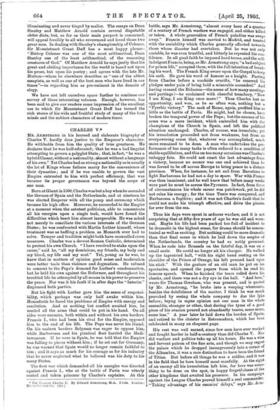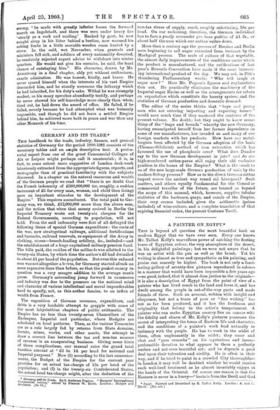CHARLES V.* Mn. AnaisTnotao in his learned and elaborate biography
of Charles V. hardly does justice to the Emperor's character. He withholds from him the quality of true greatness. He declares that he was half-educated; that he was a bad linguist attempting to govern a polyglot State ; that, in fact, " he was a hybrid Caesar, without a nationality, almost without a language of his own." Yet Charles had as strong a nationality as is usually the lot of Kings whose fathers marry for the convenience of their dynasties ; and if he was unable to govern the vast Empire entrusted to him with perfect efficiency, that was because its proper governance was beyond the scope of one man.
Born at Ghent in 1500, Charles was but a boy when he ascended the thrones of Spain and the Netherlands, and at nineteen he was elected Emperor with all the pomp and ceremony which became his high office. Moreover, he succeeded to the Empire at a moment when the astutest politician, able to concentrate all his energies upon a single task, would have found the difficulties which beset him almost insuperable. He was asked not merely to conciliate the various interests of the German States; he was confronted with Martin Luther himself, whose treatment was as basing a problem as Monarch ever had to solve. Temper and tradition might both have counselled stern measures. Charles was a devout Roman Catholic, determined to protect his own Church. " I have resolved to stake upon the cause," said he, "all my dominions, my friends, my body and my blood, my life and my soul." Yet, young as he was, he knew that in matters of opinion good sense and moderation were better tools than violence and dogmatism. He refused to consent to the Pope's demand for Luther's condemnation, but he held his own against the Reformer, and throughout his troubled life he attempted by all means in his power to preserve the peace. Nor was it his fault if in after days the "Interim" displeased both parties.
But his fight with Luther gave him the sense of responsi- bility, which perhaps was only half awake within him. Henceforth be faced the problems of Empire with energy and resolution. And as nothing but conflict awaited him, he needed all the arms that could be put in his hand. On all sides were enemies, both within and without his own. borders. Francis I., who had been his rival for the Empire, opposed him to the end of his life. The Pope was never his friend. On his eastern borders Solyman was eager to oppose him, while Barbarossa and his piratical fleet harried the Medi- terranean. If he were in Spain, he was told that the Empire was falling to pieces without him ; if he set out for Germany, he was warned that Spain would no longer remain faithful to him ; and it says as much for his courage as for his industry that he never neglected what he believed was his duty to his many States.
The first war which demanded all his energies was directed against Francis I., who at the battle of Pavia was utterly routed and taken prisoner by Charles's captains. At this
• The Emperor Charles V. By Edward Armstrong, M.A. 2 vols. London : Macmillan and Co. [21s.1 battle, says Mr. Armstrong, "almost every hero of a quarter of a century of French warfare was engaged, and either killed or taken. A whole generation of French paladins was awe pt away." Francis himself was carried to Madrid, and treated with the amiability which Charles generally affected towards those whom disaster bad overtaken. But he was not only amiable, he was even trustful, and bitterly he repented his con- fidence. In all good faith he imposed hard terms, and the self- indulgent Francis, being, as Mr. Armstrong says, "a bad subject for prison life," accepted them, with the full intention of break- ing his word. The French King swore upon the Gospel to keep his oath. He gave his word of honour as a knight. Parting from Charles before a roadside crucifix, "he renewed his pledges under pain of being.held a miserable scoundreL" And having crossed the Bidassoa—the scene of how many meetings and partings !—he exclaimed with cheerful treachery, "Now I am King, I am King once more !" Thus Charles lost an opportunity, and won, as he so often won, nothing but a "Pyrrhic victory." The sack of Rome, again, profited him as little as the battle of Pavia. He might, bad he chosen, have broken the temporal power of the Pope ; but the success of his arms was a mere incident, which embroiled him with the champions of the Church in Spain, and left the political situation unchanged. Charles; of course, was irresolute; yet his irresolution proceeded not from weakness, but from an overpowering sense that, whatever was accomplished, much more remained to be done. A man who undertakes the per- formance of too many tasks is often reduced to a condition of stable equilibrium, and this on too many occasions was Charles's unhappy fate. He could not exact the last advantage from a victory, because no sooner was one end achieved than he was forced to be off across Europe to bring peace to a distant province. When, for instance, he set sail from Barcelona to fight Barbarossa he had not a day to spare. War with France was then imminent, and he well knew that before many weeks were past he must be across the Pyrenees. In fact, from force of circumstances his whole career was patchwork, yet he did not relax his energy ; for the time Tunis was conquered, and Barbarossa a fugitive ; and it was not Charles's fault that he could not make his triumph effective, and drive the pirates for ever from the sea.
Thus his days were spent in arduous warfare, and it is not surprising that at fifty-five years of age he was old and worn- out. Maybe his life had been packed too full of incident to be dramatic in the highest sense, for drama should be concen- trated as well as exciting. But nothing could be more dramatic than that final scene in which he laid down the sceptre of the Netherlands, the country he had so nobly governed. When he rode into Brussels on the fateful day, it was on a small mule. He could no longer sit his charger. He walked up the tapestried hall, " with his right hand resting on the shoulder of the Prince of Orange, his left pressed hard upon his stick." With the gesture of an old man he put on his spectacles, and opened the papers from which he read his famous speech. When he finished the tears rolled down his cheeks, and there was not a dry eye in the ball. "And here," wrote Sir Thomas Gresham, who was present, and is quoted by Mr. Armstrong, "he broke into a weeping whereunto, besides the dolefulness of the matter, I think he was much provoked by seeing the whole company to doo the lyke before; beyng in myne opinion not one man in the whole assemblie, stranger or other, that during the tyme of a good piece of his oration poured not abundantly teams, some more, some less." A year later he laid down the burden of Spain, and retired to the cloister in Estremadura, which has been celebrated in many an eloquent page.
His rest was well earned, since few men have ever worked and fought harder in half-a-century than did Charles V. Nor did warfare and politics take up all his hours. He was a wise and fervent patron of the fine arts, and though we may regret the palace which he dropped incongruously into a corner of the Alhambra, it was a rare distinction to have been the friend of Titian. But before all things he was a soldier, and it was in the field that he bore himself most manfully. At the sight of an enemy all his irresolution left him, for here was some- thing to be done on the spot, in happy forgetfulness of the other kingdoms that awaited his presence. In his campaign against the League Charles proved himself a real commander. " Taking advantage of his enemies delays," says Mr. Arm' strong, " he made with greatly inferior forces the forward march on Ingolstadt, and there was seen under heavy fire • steady as a rock and smiling.' Racked by gout, he now sought sleep in his litter behind a bastion, now warmed his aching limbs in a little movable wooden room heated by a stove. In the cold, wet November, when generals and ministers fell sick, and soldiers of every nationality deserted, he resolutely rejected expert advice to withdraw into winter quarters. He would not give his enemies, he said, the least chance of outstaying him." His character, drawn by Mr. Armstrong in a final chapter, ably yet without enthusiasm, exacts admiration. He was honest, kindly, and brave. He never spared himself when the interests of his vast Empire demanded him, and he stoutly overcame the lethargy which he had inherited, for his duty's sake. Withal he was strangely modest, as his many speeches abundantly testify, and perhaps he never showed his self-knowledge more clearly than when, tired out, he laid down the sword of office. He failed, if he failed, merely because he had attempted what was humanly impossible, and though he did not leave a settled Empire behind him, he achieved more both in peace and war than any other Monarch of his time.



























































 Previous page
Previous page